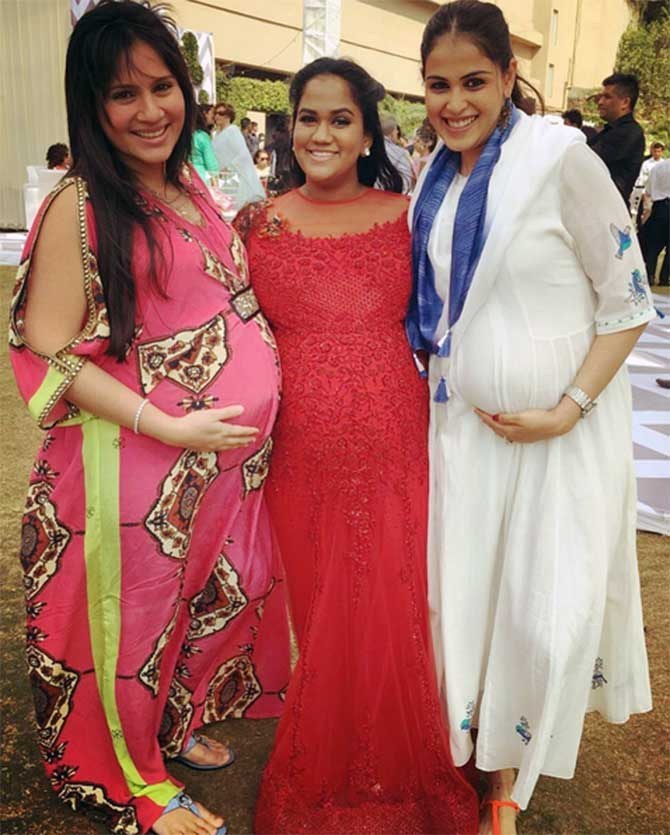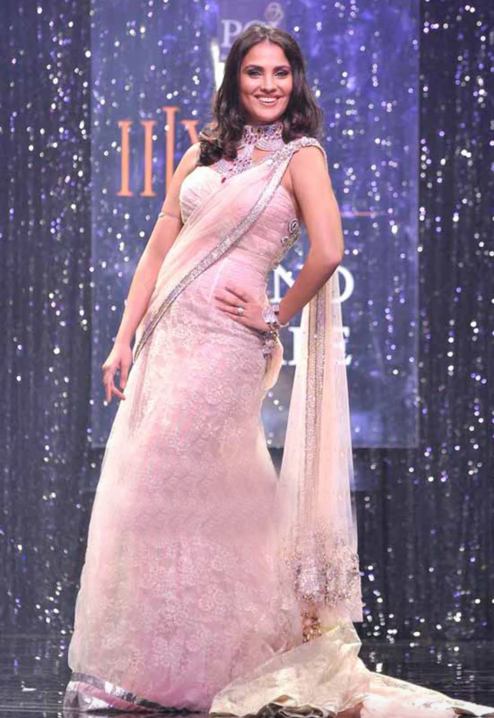
On March 31, Carol Gracias walked down the ramp at Mumbai’s Lakme Fashion Week as she does every year. Carrying the kind of poise and confidence that comes with two decades of practice, she was the showstopper – literally and figuratively. Despite being a mainstay on Indian runways, Gracias made it to the pages of several newspapers and media outfits. It wasn’t for the Gaurang Shah handloom saree that she was wearing, but for the baby bump peeking out from under it.
“I’ve been doing Gaurang’s shows for many years now. This time as usual Gaurang called and asked if he could cast me,” Gracias told BuzzFeed. “I told him I was pregnant and he still asked if I would walk for the show… I thought, if the designer would like me in his show, then why not?”
Websites covered Gracias’s appearance as “breaking convention” and “busting stereotypes”. Social media was rife with well-deserved applause and the now-familiar “yaaass queen” brand of encouragement. While the internet loudly celebrated and intellectualised Gracias’s decision to walk a ramp while pregnant, I felt a strange relief. A reassurance. A calmness. I’ll explain.

“You girls work too hard. Kya faida hai? Anyway in two-three years, you’ll be spending time with the kids, no?”
“Spend less time at work and find a boy fast, beta. Your clock is ticking.”
“MBA? Now? Bachche?”
Our extroversion about pregnancies and motherhood stops at the workplace.
I’ve kept close track of all the unsolicited advice I’ve received from distant older relatives, well-meaning parlour aunties, and other people’s grandmothers at weddings. I’ve cross-referenced it, over Kingfishers and Classic Milds, with several female friends’ databases. I’ve found patterns.
If you’re a twentysomething woman and you listen closely, you’ll notice that you’re being nudged toward becoming one specific person. This woman is well educated, though not too educated. She has a stable job at which she’s successful, but not successful enough to be threatening. She’s thin and she’s fair and, most importantly, she plans to get married and then manifest her ultimate destiny: babies. Once she has them, her children will replace every other active sphere of her life. That last part of her trajectory is non-negotiable. It’s non-optional. It’s assumed.

Behind every pregnant woman are two overjoyed and laddoo-bearing grandmothers. In front of her is an iPhone front-camera, live-documenting the gestation in selfies. While it used to be conventional for celebrities to hide through their pregnancies (remember Aishwarya Rai Bachchan's disappearance?), that's changed in the last couple of years. Genelia Deshmukh, Arpita Khan, and Shweta Salve (amongst many others) have celebrated their journeys into motherhood publicly. And it's a relief. But our extroversion about pregnancies and motherhood stops at the workplace. Examples of working mothers are rare in our cinema, in our celebrities, and in our pop-culture as a whole.
I recently attended a conference for creative professionals where I heard a male startup head confess that he leans toward putting men in management positions, because any woman in her twenties or thirties is only good for a few more years.
“It doesn’t matter how ambitious and all they are at twenty-five, ya,” I heard him say. “By thirty, they’ll all step back… You know... I have to think of the company first.”
I know too many women who, for this reason, have been passed on for positions they were best qualified to occupy.
He smiled and moved on to banal smalltalk while I reeled at the casualness with which he’d written off the worth of an entire swath of working professionals. Including myself.

If passing comments weren’t enough, we also have pop culture to learn from. In ads, we see models playing mothers whose only highlighted accomplishment is having chosen the right cereal for her son and the healthiest cooking oil for her husband. In Bollywood, we see countless actresses’ careers come to screeching halts at the very hint of a pregnancy while Shah Rukh’s has survived three children, no problemo.
This past weekend, I watched Ki & Ka, which can only be described as a garbage truck reformatted into the cinematic medium. But within that three-hour intellectual assault, there was one scene that felt too real. Career woman Kia (played by Kareena Kapoor Khan) peed on a pregnancy test, got back "Positive", and immediately flew into a panic, mourning the immediate, sudden, and irrevocable demise of her career.
Motherhood is revered in India. Bharat Mata, Gai Mata, Mother India, Amma. That reverence stems from the genuine fact that motherhood is a concoction of selflessness and sacrifice. Implied in the reverence is an assumption that, amongst many sacrifices, one of them will be of independent ambition. So maybe that reverence isn’t such a great thing. Maybe it’s scary as hell. I don't know.
At worst, the message being peddled is this: if you’re a good mother, you don’t have the time or inclination to be much else.

As an unmarried, childless, workaholic twentysomething, these comments, facts, and anecdotes scare the shit out of me. Mostly because sexism is bad generally and all the time. But also because I really, really love the work I do. And I hope to do it for a long time. And I hope that, regardless of when and whether I choose to start a family, I’ll enjoy the same opportunities as my male counterparts do at every juncture.
The more success I’ve found professionally, the more this fear has intensified. The fear that this work doesn’t actually matter. That regardless of it, there is a choice to be made in a few years: to be a good mother, or to go to work.
It was refreshing and reassuring to see a woman owning her decision to be a mother, while carrying on with business as usual.
Last year, Quartz tried to resolve the vast discrepancy between the number of women who graduate from India’s top engineering colleges every year, and the far-smaller number of women who occupy senior positions in the country’s listed companies. A reporter reached out to over a dozen women engineering graduates from the 1990s and found, across the board, that those of whom gave up careers did so because they found it impossible to balance work with maternity. They gave up their jobs because of insufficient support from their families, employers, or both, when it came to raising children. These are smart women who were ambitious enough to get into and graduate from top engineering colleges at a time when it was rare and revolutionary for women to do either.
This scares the hell out of me.

So it was a relief to see Carol Gracias at work, literally (and at #WERQ, figuratively), while pregnant. It was refreshing and reassuring to see a woman owning her decision to be a mother, while carrying on with business as usual on her professional turf.
(It’s worth noting that both Lara Dutta and Malaika Arora Khan have walked fashion show ramps while pregnant, but both were celebrity guest showstoppers i.e. they were put on stage for the novelty of their pregnancy, rather than without any fanfare about it.)
I found incredible solace in the banality of Gracias’s presence there. I found relief in the mundanity of seeing Carol Gracias on a runway. Her images are stunning for many reasons, and my favourite is that it was just a woman doing her job – a job she’s done for years already, which she’s earned recognition and success for, and which she’s very, very good at. Like so many working mothers do in less glamorous sectors than fashion every day, just by showing up, Gracias assuaged one of my greatest fears.
But more significantly, I found solace in her colleagues cheering for her when she showed up to work with motherhood in tow. I found solace in the fact that a designer chose her to be his showstopper, supported her career at this juncture, rather than discouraging it. I found solace in her changing body gaining acceptance and applause in an industry where success has long been predicated on possessing one very specific body type. I found solace in the fact that she was praised, rather than rebuked or criticised or discouraged as so many Indian working mothers have been for decades, for striving to earn a living.
I found solace in the mainstream’s loud, thrilled acceptance of the fact that a woman has decided to become a mother, and that she’s going to keep showing up to work while she does it.


